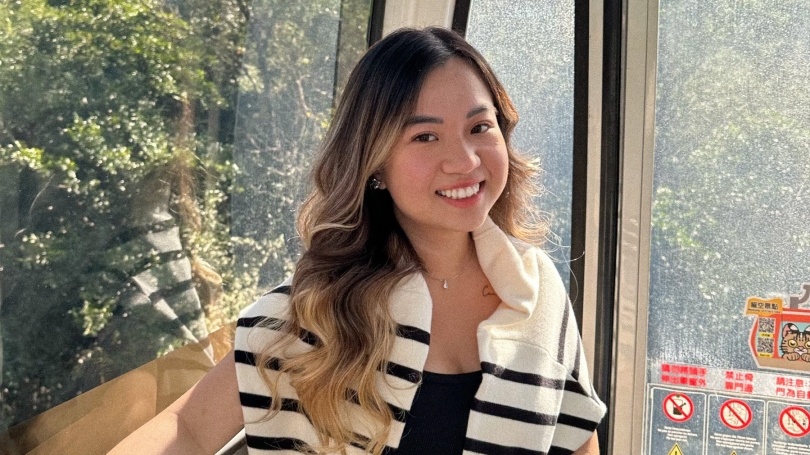Camella Pham, Guarini '23, was awarded the American Comparative Literature Association's Presidential Master's Prize for Best Master's Thesis for "Colonial Translation Turned Vietnamization: Pham Quỳnh and the Discourse of Transculturation".
The award honors comparative work broadly construed at the level of a master's thesis. The work is judged on theoretical rigor, comparative breadth, and lucidity of exposition with an emphasis on work that is engaged in comparison across linguistic boundaries.
What do you consider your hometown?
I was born and raised in Ho Chi Minh City (Saigon), Vietnam, so I consider Vietnam my hometown. At 17, I came to the U.S. to pursue my B.A. degree in Comparative Literature. After living in various U.S. states, I now reside in Taipei, Taiwan, where I am studying Chinese language.
Where did you earn your undergraduate degree?
I received my B.A. in Comparative Literature and Chinese Language and Literature from the University of Iowa, where I was also selected as the Class of 2022 Commencement Student Speaker.
Why did you choose this topic for your thesis?
I've always been fascinated by languages, likely influenced by my exposure to a multilingual background from an early age. After my father migrated to southern Vietnam, he graduated from Lycée Marie Curie, a high school in Saigon established by the French colonial government, where most instruction was in French. Consequently, he picked up some French along the way.
I grew up speaking Vietnamese at home, learned English as a second language in school, encountered Nôm characters (a classical writing system of the Vietnamese language based on Classical Chinese) in Buddhist temples due to my mother's religion, and later pursued Mandarin Chinese as my major in college. My younger brother has also taken extensive Japanese classes. This diverse linguistic background led me to contemplate how we can effectively and intimately grasp the "arcane" nature of languages as profoundly abstract concepts.
As a child, I devised a solution by likening them to animals. For instance, I often envisioned English as embodying the heroic prowess and physical stature, akin to a leopard, while Vietnamese possessed the charm and elegance of a peacock (I guess the French language could be compared to a fancy royal Siberian cat, and Chinese extended its influence far and wide, like a sea dragon). Vietnamese, with its rich folkloric tradition and ever-expanding Sino-Vietnamese vocabulary, employs elaborate sentences adorned with adjectives and adverbs. In contrast, English, with its preference for verbs and action, treated words and phrases as building blocks, stacking them upon one another. English exhibited a distinct aversion to long sentences with complex subordinate clauses.
Reflecting on this personal anecdote, I believe that the political and historical background of colonial Vietnam mirrored the same linguistic angst: navigating contested political ideals across multiple languages and scripts. Various factions weaponized languages and scripts to serve their divergent aims, from colonization and auto-colonization to decolonization and anti-colonization. Translation played a pivotal role in this process, not merely as a unidirectional path from one language to another, but as a complex nexus of negotiations and transformations. Unfortunately, there has been insufficient scholarly attention devoted to this research aspect in Vietnam, which is the main reason why I find this topic particularly fascinating.
What does it mean to you to receive the award?
The ACLA Presidential Master's Prize is undeniably the most prestigious award I have received since embarking on my higher education journey in the U.S. Personally, this award serves as a testament to the exceptional support and mentorship I have received at both my undergraduate institutions and Dartmouth. When speaking with my professors at Dartmouth, I often jest that any project I undertake, whether it's my M.A. essay, Ph.D. application, or my first conference paper, feels like a collaborative endeavor rather than solely my own. This is largely due to the invaluable guidance provided by my advisors at Dartmouth. My professors have not only helped shape my arguments, but also directed me towards targeted secondary academic sources, and posed incisive questions that have organized my jumble of ideas. I believe the ACLA award is no exception, as it reflects the spirit of professional mentorship that has been instrumental to my academic growth.
Why did you choose Dartmouth to pursue your degree?
Dartmouth has all the faculty mentors whose research specializations are invaluable for the development of my intended project on colonial Vietnamese literature, which is marked by linguistic contestations and ideological interactions among various parties. These include the native Vietnamese subjects, French administrative colonialists, Sinophone Chinese intellectuals and merchants, Japanese military occupants, as well as fellow Southeast Asians from Laos and Cambodia within the colonial Indochinese grouping.
What did you like best about your Dartmouth experience?
The most remarkable aspect of my Dartmouth experience lies in the unwavering encouragement and tireless mentorship of the professors. I am deeply indebted to Professor Edward Miller (ASCL and History), affectionately known as Thầy Ed, for generously sharing his expertise on colonial Vietnam, grounding my work in historical context, and continually guiding me to achieve precision and clarity.
I am also immensely grateful to Professor Miya Xie for her extensive knowledge in literary translation, comparative theory, and intra-East Asian connectivity, which have been crucial to the foundation of my project. Within the Dartmouth Program in Comparative Literature, I would also like to thank Professor James Dorsey for his unwavering support, multiple recommendation letters for my Ph.D. application, and nomination for the ACLA Award. There are certainly more unsung heroes whose contributions have made my Dartmouth experience both liberating and rewarding.
What are you doing now and/or what are your plans for the future now that you have graduated?
I have recently completed my Ph.D. application in Comparative Literature, with a focus on critical translation studies in Vietnam and Southeast Asia. I have received positive responses from several schools and am currently in the process of deciding where to commit. As of now, it is more likely that I will choose a school on the East Coast.
